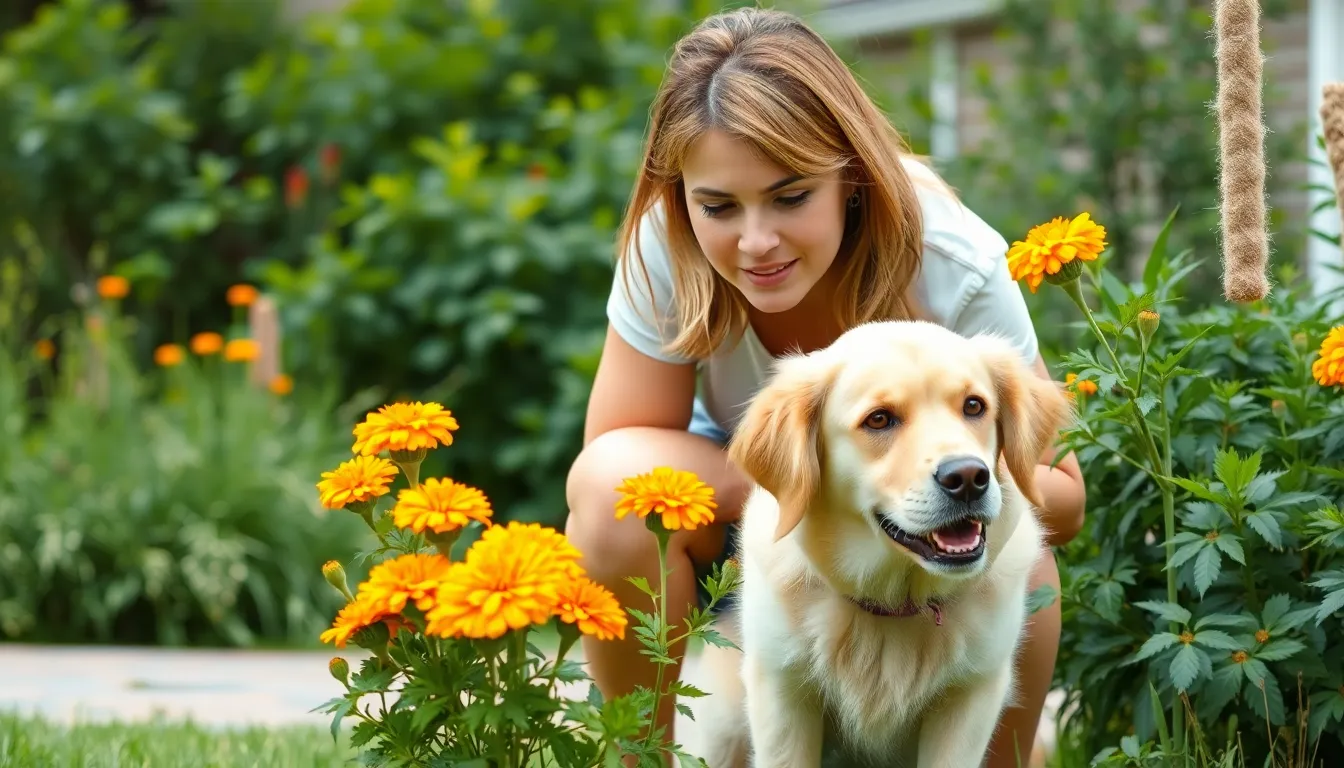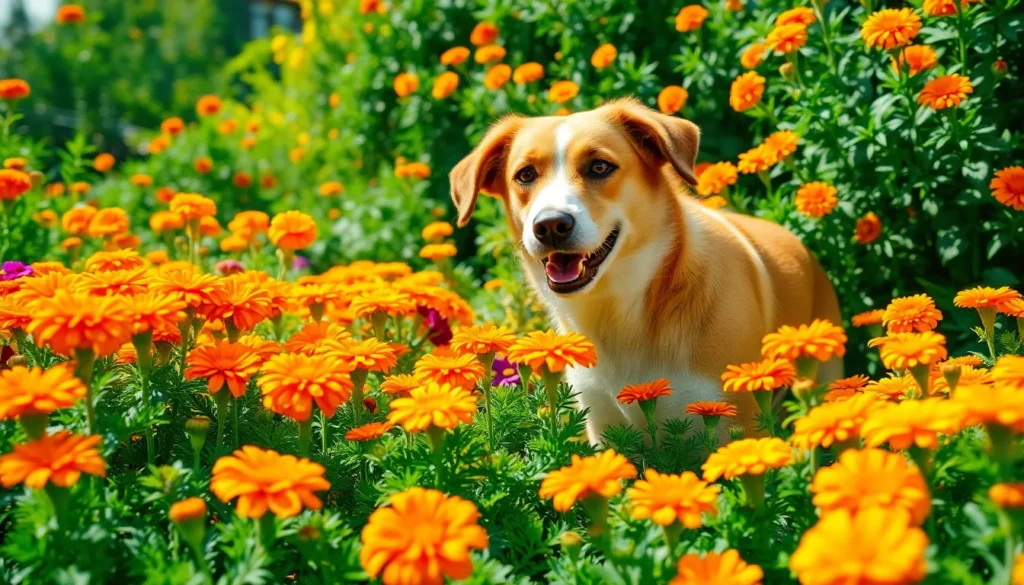When it comes to keeping furry friends safe, pet owners often find themselves in a floral frenzy. Marigolds, with their vibrant colors and cheerful blooms, might catch your eye, but do they pose a threat to your four-legged companions? Spoiler alert: they’re not exactly the doggy delight they seem to be.
While marigolds can add a pop of color to any garden, it’s essential to know whether they’re a no-go for pups. Imagine your dog eyeing that marigold like it’s a gourmet treat—yikes! Understanding the potential risks can save you from an unexpected trip to the vet. So let’s dig into the facts and find out if these sunny flowers are a friend or foe for our canine pals.
Table of Contents
ToggleOverview of Marigolds
Marigolds, known for their vibrant colors and hardiness, belong to the Tagetes genus. These flowers attract gardeners for their aesthetic appeal and potential pest-repellent qualities.
Types of Marigolds
Several types of marigolds exist, each with unique characteristics. French marigolds typically grow to about 6 to 12 inches tall and feature small, bushy blooms. African marigolds, in contrast, can reach 1 to 3 feet in height, boasting large, globe-shaped flowers. Signet marigolds are smaller and often used for culinary purposes due to their edible petals. All these varieties offer diverse shapes and hues, making marigolds a popular choice in gardens and landscapes.
Common Uses of Marigolds
Marigolds serve multiple purposes in gardens and beyond. Many gardeners cultivate marigolds to deter pests, as their strong scent repels aphids and nematodes. Additionally, these flowers enhance garden aesthetics, providing vivid coloration. Gardeners often use marigolds in companion planting, promoting better growth in neighboring plants. Some cultures even utilize marigolds in festivals and rituals, celebrating their beauty and symbolism. The versatility of marigolds makes them a treasured addition to many outdoor spaces.
Understanding Canine Toxicity

Canine toxicity refers to harmful effects that certain substances can have on dogs. Understanding this concept is crucial for pet owners who want to safeguard their furry companions from potential dangers.
What Is Canine Toxicity?
Canine toxicity occurs when dogs ingest or come into contact with toxic substances. Each substance presents different levels of risk, depending on the dog’s size, age, and overall health. Many common plants, including specific flowers, contain compounds that can trigger adverse reactions. Pet owners should remain aware of these dangers, especially as curious dogs tend to explore their environments by tasting various items.
Signs of Poisoning in Dogs
Recognizing signs of poisoning in dogs is crucial for timely intervention. Symptoms may include vomiting, diarrhea, lethargy, and difficulty breathing. Increased salivation, seizures, and loss of appetite also serve as warning signals. Observing a dog for any unusual behavior after potential exposure to toxic substances can make a significant difference in health outcomes. Swift veterinary attention can often mitigate serious consequences.
Are Marigolds Toxic to Dogs?
Marigolds are not classified as highly toxic to dogs, but they can cause mild gastrointestinal upset if ingested. Understanding their effects is essential for pet owners.
Scientific Evidence
Studies indicate marigolds contain compounds like thiophenes, which may lead to digestive issues in dogs, including vomiting and diarrhea. While these reactions aren’t life-threatening, they emphasize the importance of monitoring a dog’s behavior around flowers. Additionally, anecdotal reports support this data, noting that larger quantities of marigolds can lead to more severe symptoms. It’s crucial for pet owners to recognize that individual dogs may react differently depending on various factors such as health and size.
Expert Opinions
Veterinarians generally consider marigolds to be low-risk plants for dogs, yet caution always remains advisable. Experts often stress the significance of preventing any potential ingestion, as even non-toxic plants can cause discomfort. Regularly consulting with a veterinarian helps ensure a well-informed approach to pet care. Moreover, in cases of accidental consumption, immediate veterinary advice proves beneficial to prevent complications. Thus, maintaining awareness and taking preventative measures can help safeguard pets in gardens adorned with marigolds.
Alternatives to Marigolds
Pet owners can consider several alternatives to marigolds that are safe for dogs. Selecting pet-safe plants ensures a worry-free garden environment.
Pet-Safe Plants
Lavender, snapdragons, and pansies stand out as excellent choices. All of these plants add color and texture while being safe for canine companions. Moreover, herbs like basil and parsley double as tasty treats for pets. Sunflowers also brighten up gardens and pose no risks to dogs. Pet owners who want a vibrant landscape should prioritize these options to avoid any potential health issues related to toxic plants.
Safe Gardening Practices
Gardening practices should prioritize safety for pets. Fencing off garden areas can prevent dogs from accessing potentially harmful plants. Regularly monitoring the garden allows pet owners to identify any ingested plants and address concerns quickly. Teaching pets commands, such as “leave it,” helps deter them from nibbling on plants, enhancing their safety. Utilizing organic gardening methods limits exposure to chemicals that could threaten a dog’s health. Keeping the garden well-maintained lowers the risk of accidental ingestion of harmful plants, creating a friendly space for pets and owners alike.
Marigolds can add beauty to any garden but pet owners should take precautions. While these flowers aren’t highly toxic to dogs, they can cause mild gastrointestinal upset if ingested. It’s essential for dog owners to monitor their pets around marigolds and recognize any signs of distress. Creating a safe environment is key.
By opting for pet-safe alternatives and implementing good gardening practices, pet owners can enjoy a vibrant garden without worrying about their furry friends. Regular veterinary check-ups and prompt attention to any potential ingestion can further ensure a happy and healthy pet.








